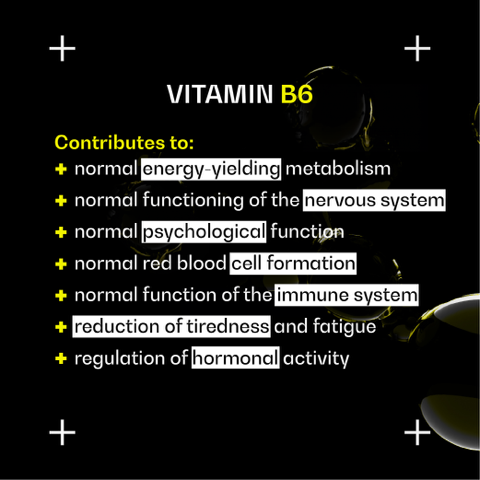WHAT IS VITAMIN B6 GOOD FOR?
Vitamin B6, also known as pyridoxine, plays key roles in converting food into energy, keeping the brain and nervous system functioning properly and production of haemoglobin, the protein in blood that carries oxygen throughout the body. It also helps the body make the hormones serotonin (which regulates mood) and norepinephrine (which helps your body cope with stress). And it helps the body make melatonin, which is important in helping regulate your internal clock and your sleep. Furthermore, a growing body of research suggests that vitamin B6 may play a role in testosterone production, slowing cognitive decline and age-related memory loss and reducing our risk of certain diseases.

Because vitamin B6 is a water-soluble vitamin, it cannot be stored in the body and must be obtained daily from diet or supplements.
Most people can get enough vitamin B6 through their diet, but certain populations may be at risk for deficiency. Some of the top sources of B6 are protein-rich foods such as meat, poultry, and fish. If your diet tends to be scarce on protein, you may want to pay attention to how much B6 you’re getting and consider taking a supplement.
SCIENTIFIC BENEFITS OF VITAMIN B6
MAINTAINING ENERGY LEVELS
Vitamin B6 helps maintain our energy levels by contributing to energy-yielding metabolism, red blood cell formation and the reduction of tiredness and fatigue. For example:
+ Research shows that B6 is essential for the production of energy, specifically for the chemical breakdown of glycogen – which gives our bodies the glucose it needs for physical activity. Glucose, along with fat and protein is one of the body's primary fuel sources.
+ Research shows vitamin B6 is vital for normal red blood cell formation which is critical for efficiently transporting oxygen throughout the body. When red blood cells reach tissues that need oxygen, the oxygen is released from the haemoglobin present in red blood cells and diffuses into the tissues where it is used to make energy.
+ Research shows that chronic deficiency in vitamin B6 may trigger microcytic anaemia, symptoms of which include fatigue and weakness.
PREVENTING AND TREATING ANEMIA BY AIDING HEMOGLOBIN PRODUCTION
Vitamin B6 may be helpful in preventing and treating anaemia caused by deficiency, due to its role in hemoglobin production. Hemoglobin is a protein contained in red blood cells that delivers oxygen to your tissues. When you have low hemoglobin, your cells don’t get enough oxygen. As a result, you may develop anaemia (a condition that develops when our blood produces a lower-than-normal amount of healthy red blood cells). Studies have linked low levels of vitamin B6 with anaemia. Anaemia results in the body not getting enough oxygen-rich blood, which can result in fatigue and weakness. For example one study found that taking 75 mg of vitamin B6 daily during pregnancy decreased symptoms of anaemia in 56 pregnant women who were unresponsive to treatment with iron.
PROMOTING BRAIN HEALTH AND REDUCING ALZHEIMER’S RISK
A growing body of research suggests that Vitamin B6 may prevent a decline in brain function by decreasing homocysteine levels that have been associated with Alzheimer’s disease and memory impairments. One such study in 156 adults with high homocysteine levels and mild cognitive impairment found that taking high doses of B6, B12 and folate (B9) decreased homocysteine and reduced wasting in some regions of the brain that are vulnerable to Alzheimer’s.
IMPROVING MOOD AND REDUCING SYMPTOMS OF DEPRESSION
Vitamin B6 plays an important role in mood regulation because it is necessary for creating serotonin, dopamine and gamma-aminobutyric acid (GABA) which are neurotransmitters that regulate emotions. Several studies have shown that depressive symptoms are associated with low levels of vitamin B6, especially in older adults who are at high risk for B vitamin deficiency. For example, a study in 250 older adults found that deficient blood levels of vitamin B6 doubled the likelihood of depression.
REGULATING HORMONAL ACTIVITY AND MAINTAINING TESTOSTERONE LEVELS
Vitamin B6 contributes to the the regulation of hormonal activity including maintaining healthy levels of testosterone, which plays a role in sexual health and function. Furthermore, vitamin B6 is essential for the production of neurotransmitters, which are chemicals that transmit signals between nerve cells. These neurotransmitters play a crucial role in sexual arousal and response. Researchers believe that vitamin B6’s effect on sexual function is due to its impact on neurotransmitters and hormones.
SUPPORTING ERECTILE FUNCTION
Researchers believe vitamin B6 supplements may improve erectile function. This is because vitamin B6 is involved in the breakdown of homocysteine – an amino acid which can damage artery linings when allowed to build up in the circulation. Hardening and furring up of the arteries (atherosclerosis) is a leading cause of erectile difficulties in older males and in those with diabetes. For example, a systemic review and meta-analysis of nine studies including 1,320 men found that the men with erectile dysfunction (ED) were approximately twice as likely to have elevated levels of homocysteine.
STRENGTHENING THE IMMUNE SYSTEM
Vitamin B6 participates in the functioning of the entire immune system and research shows adequate levels of B6 help prevent various diseases. For example one such study summarised the available evidence on the role of vitamin B6 in alleviating the symptoms of COVID-19 infection and complications such as diabetes, hypertension and heart disease after Covid-19. Another study found B6 deficiency leads to a decrease in immunity, including the formation of serum antibodies, decreased production of IL-2, and increased IL-4. This is relevant because there is an inverse relationship between vitamin B6 and IL-6 and TNF-α levels in conditions of chronic inflammation. And research has shown that chronic inflammation is associated with numerous diseases, including diabetes, cancer, auto-immune diseases and cardiovascular diseases.
PREVENTING CLOGGED ARTERIES AND REDUCING HEART DISEASE RISK
Vitamin B6 may prevent clogged arteries and reduce high homocysteine levels that lead to narrowing of arteries which are associated with heart disease risk. This is likely due to the role of B6 in decreasing elevated homocysteine levels. Research shows that people with low blood levels of vitamin B6 have almost double the risk of getting heart disease compared to those with higher B6 levels. Furthermore, a randomized controlled trial involving 158 healthy adults who had siblings with heart disease divided participants into two groups, one that received 250 mg of vitamin B6 and 5 mg of folic acid every day for two years and another that received a placebo. The group that took B6 and folic acid had lower homocysteine levels and less abnormal heart tests during exercise than the placebo group, putting them at an overall lower risk of heart disease.
LOWERING THE RISK OF CANCER
Some observational studies suggest a link between adequate dietary intake and blood levels of vitamin B6 and a decreased risk of certain types of cancer. For example a systematic review found an undoubtedly strong relationship between vitamin B6 intake and the appearance of cancer, regardless of where it occurs. The strongest connection occurs in gastrointestinal cancer. Another review of 12 studies found that both adequate dietary intake and blood levels of B6 were associated with lower risks of colorectal cancer, and that the individuals with the highest blood levels of B6 had an almost 50% lower risk of developing this type of cancer.
MAINTAINING EYE HEALTH AND PREVENTING EYE DISEASES
Studies have shown that Vitamin B6 may play a role in preventing eye diseases, especially a type of vision loss that affects older adults called age-related macular degeneration (AMD). Since vitamin B6 helps reduce elevated blood levels of homocysteine, getting enough B6 may lower your risk of this disease. Research has also linked low blood levels of vitamin B6 to eye conditions that block veins that connect to the retina. A separate study in over 500 people found that the lowest blood levels of B6 were significantly associated with retinal disorders.
HIMMENSE supplements contain Vitamin B6.
Advice is for information only and should not replace medical care. Consult a doctor or healthcare professional if you have any questions or are taking any other medications before you try any supplements.
Read more Men's Health & Lifestyle blogs from HIMMENSE here



